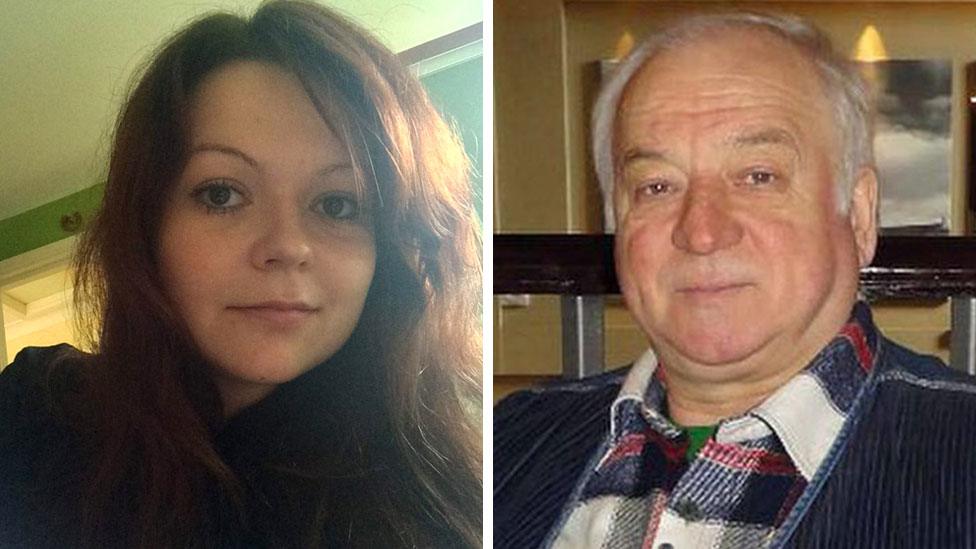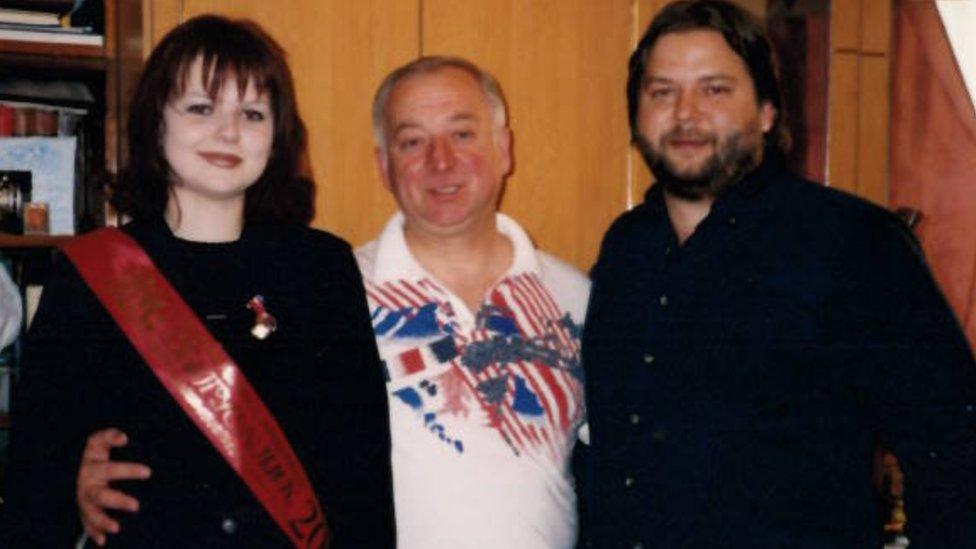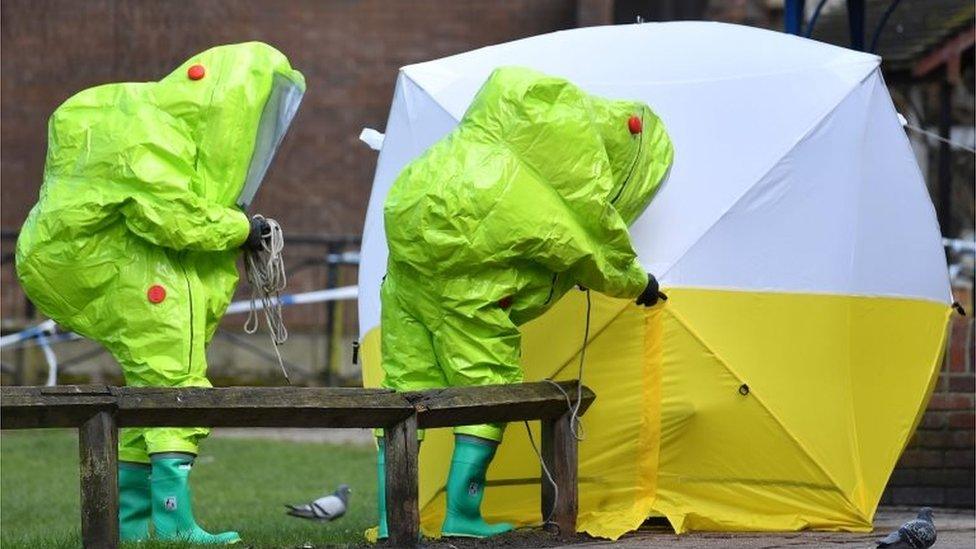Russian spy poisoning: Sergei Skripal 'improving rapidly'
- Published

Sergei Skripal, 66, and his daughter Yulia, 33, remain in hospital
Russian former spy Sergei Skripal is no longer in a critical condition after being poisoned by a nerve agent, doctors have said.
Salisbury District Hospital said Mr Skripal is responding well to treatment and "improving rapidly".
Mr Skripal, 66, and his daughter Yulia, 33, have been in hospital for more than a month after being found unconscious on a bench in Salisbury.
They had been poisoned with a toxic nerve agent called Novichok.
Ms Skripal is conscious and talking in hospital.
The UK government claims Russia is behind the attack but Moscow has denied all involvement, calling the accusations "horrific and unsubstantiated".
Meanwhile, the UK has refused to grant a visa to Yulia's cousin, Viktoria Skripal, the BBC has learned.
The Home Office said the application did not comply with immigration rules. A government source told the BBC it appears Russia is "trying to use Viktoria as a pawn".
The Russian Embassy said Sergei and Yulia Skripal "remain hidden from the public" as a result of the visa decision and the "only relative" who could reasonably expect to see them is "kept out of the UK".
"The stubborn refusal to cooperate, to provide transparency and to answer the numerous questions means Britain has something to hide," an embassy spokesman said.
Viktoria later told the BBC she did not have enough money in her bank account to satisfy the visa requirements.
It comes after Russian TV aired a recording of an alleged phone conversation between Viktoria and Yulia on Thursday.
Doubts were raised over its authenticity but Viktoria has told Newsnight she was 100% certain it was Yulia.
'Strength is growing'
In a statement from the hospital, medical director Christine Blanshard urged people to respect Ms Skripal's privacy "while she continues to get better".
"As Yulia herself says, her strength is growing daily and she can look forward to the day when she is well enough to leave the hospital," Dr Blanshard said.
"Any speculation on when that date will be is just that - speculation."

Viktoria Skripal gave the BBC this picture of Sergei Skripal (centre) with his daughter Yulia and late son Alexander
The BBC's diplomatic correspondent James Landale said Mr Skripal's recovery meant "we now have two individuals at the heart of this incident in Salisbury who can now speak".
He said: "They can speak to investigators about their last movements, were there any threats, were there any other circumstances?"
Following the update on Mr Skripal's condition, the Russian Embassy tweeted: "Good news!"
Allow X content?
This article contains content provided by X. We ask for your permission before anything is loaded, as they may be using cookies and other technologies. You may want to read X’s cookie policy, external and privacy policy, external before accepting. To view this content choose ‘accept and continue’.
The embassy later issued a statement wishing the Skripals "get well soon" and expressed hope that their recovery will "contribute to the investigation".
"We are confident that the objective probe will ultimately establish that the claims against Russia by [the] UK government are null and void," it added.
Foreign Secretary Boris Johnson also called Mr Skripal's condition "great news" and a testament to the emergency services and NHS staff.
The Foreign and Commonwealth Office said it was "very pleased" that the Skripals were improving.
"The NHS will continue to provide ongoing care for the Skripals, both of whom are likely to have ongoing medical needs," the FCO said.
"Let us be clear, this was attempted murder using an illegal chemical weapon that we know Russia possesses."

Analysis: Long-term recovery
By BBC Health and Science Correspondent James Gallagher
Recovery from a nerve agent attack is not guaranteed, but it is not always a surprise either.
Nerve agents including sarin, VX and novichok all prevent nerves functioning normally. This includes those that are necessary to breathe and keep the heart beating.
They work by disrupting an enzyme called acetylcholinesterase at the junction between nerves.
But over time, the nerve agent is metabolised and excreted by the body and new acetylcholinesterase is made. The question is whether doctors can keep patients alive long enough for that to happen.
This would have been the focus of Sergei and Yulia Skripal's care at Salisbury District Hospital. It could have included heart and lung support, the drug atropine to counteract the effect of nerve agents and sedation to prevent brain seizures.
There is still a question about the Skripals' long term recovery and whether there will be any impact on memory and brain function.

Former double agent Mr Skripal, who was jailed by Russia for spying for Britain's intelligence service but released as part of a spy swap between the US and Russia in 2010, was being visited by his daughter Yulia when the attack happened on 4 March.
The pair became ill in the centre of Salisbury after visiting The Mill pub and Zizzi restaurant.
The incident sparked an escalating diplomatic crisis between Russia and the West, with more than 20 countries expelling Russian envoys in solidarity with the UK.

Emergency service workers in biohazard suits fix a tent over the bench where pair were found
On Thursday, Russia's ambassador to the UN, Vasily Nebenzia, told the UN Security Council that Britain was "playing with fire" and had invented a "fake story".
Mr Nebenzia said Britain's main goal had been "to discredit and even delegitimise" Russia and accused the government of waging a "propaganda war".
'Respect my privacy'
In a statement released to police on Thursday, Ms Skripal said she was grateful for the many messages of goodwill she had received and the people of Salisbury who came to her aid.
She said: "I am sure you appreciate that the entire episode is somewhat disorientating, and I hope that you'll respect my privacy and that of my family during the period of my convalescence."
Britain's UN ambassador, Karen Pierce, said Russia's request for consular access to Ms Skripal has been passed on.
- Published6 April 2018
